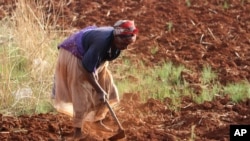Climate change has devastated communities in Africa with drought becoming the order of the day.
To mitigate the effects, a senior official in the environment ministry says the government has adopted a climate change adaptation program to reduce impact on communities as weather and climate patterns continue to change.
While world leaders are preparing to meet in Paris in December, hoping to come up with a deal on climate change, communal farmers in Buhera, Chimanimani, Chiredzi districts of Manicaland and Masvingo and others around the country will be trying to find ways on how to survive as climate changes patterns continue to be distorted.
This is negatively impacting the ordinary person's way of life with low yields becoming the norm due to poor rainfall patterns.
Veronica Gundu Jakarasi, the acting deputy director in the Ministry of Environment Water and Climate, says the government is worried by the impact of climate change on rural communities in particular hence its efforts to take remedial action.
“The ministry has initiated the national adaptation development process realizing that the impact of climate change are increasing in frequency and our communities are continuing to suffer these brutal effects of climate change,” said Jakarasi.
She says the adaptation plan is meant to ensure food security is improved in affected districts of Zimbabwe.
Under the plan, the government will encourage farmers to grow drought resilient crop varieties such as soghurm and millet, and early maturing varieties.
Farmers will also be taught how to harvest rainfall for irrigation purposes.
Jakarasi says a lot of awareness campaigns are needed to ensure word reaches every communal farmer to teach them how they can mitigate climate change.
Oxfam
She says Zimbabwe has received $4 million from Oxfam and other development partners to put the adaptation plan into action in the country’s worst affected districts through pilot programs.
Dr. Leonard Unganai of Oxfarm says his organization is operating in the three districts in collaboration with other partners that are implementing the pilot project to help communal farmers deal with the effects of climate change.
“One thing that we realize is that whatever you do, you also need to pay attention to issues of access to markets, access to rural finance and related issues as we deal with the effects of climate change,” said Unganai.
He says information on climate change should be readily available to everyone so communities can use it to their benefit.
Challenges
Lecturer Walter Svinurai with the University of Zimbabwe and also Marondera College of Agriculture, Science and Technology, says Zimbabwe is struggling to deal with climate change challenges.
“Zimbabwe just like any other developing nation is constrained by three categories of issues, mainly to do with access to information, information relating to public awareness, information relating to climate change education and also research and development climate change issues then there are also problems to do with technologies, we have inadequate capacity to generate technologies and where the technologies we can’t generate there, there’s inadequate capacity to transfer them from developed nations where they normally are produced,” he said.
Svinurai, himself a climate change expert, says it is difficult to plan and set aside a budget to deal specifically with climate change since it can never hard to predict how it can manifest itself, it could be floods, drought or anything else.
He, however, adds that communities would continue to wallow in poverty as they continue to be exposed to the pangs of the changing climate if governments are not prepared.
According to the Food and Agricultural Organization, crop yields in Southern Africa have been reduced by about 15 percent due to climate change effects as rainy seasons have become shorter and shorter resulting in many people needing food aid to survive.




